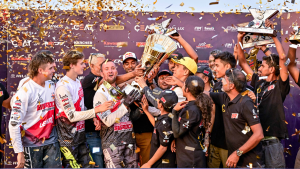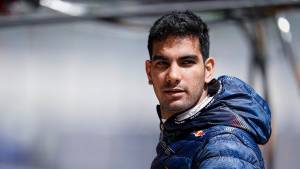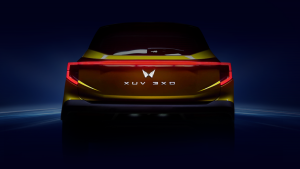Hammer time: What makes five-time F1 champion Lewis Hamilton just so good?
On the 28th of October, 2018, the Dutch National anthem, Het Wilhelmus, rang through the air at Autodromo Hermanos Rodriguez in honour of Mexican Grand Prix winner Max Verstappen. Save for Verstappen, though, it was a solemn-looking podium. On one side of the Red Bull Racing driver stood Ferrari's Sebastian Vettel, who, having just lost the 2018 championship, was less than happy. On the other side stood Vettel's team-mate Kimi Raikkonen, largely acknowledged to be the most stoic driver of them all, and the driver least likely to break into a smile on the podium.
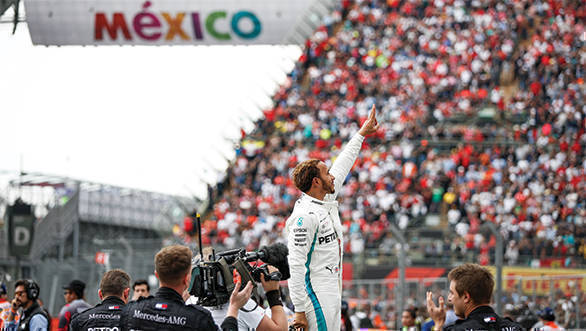 Lewis Hamilton celebrates his fifth Formula 1 world championship title at Mexico
Lewis Hamilton celebrates his fifth Formula 1 world championship title at Mexico
The true celebrations were away from the podium, where an ecstatic Lewis Hamilton was coming to terms with the fact that he was now a five-time Formula 1 world champion, hugging various members of the Mercedes team, and jumping for joy with his personal physiotherapist Angela Cullen. Hamilton, by crossing the chequered flag fourth in his No.44 Mercedes W09, had scored enough points to win his second title on the trot. His fourth title with the Mercedes team. And his fifth F1 title overall. And it was with that fifth title, that he entered one of the most elite F1 clubs in existence, occupied thus far by only two drivers - Juan Manuel Fangio (whose fifth title came at the Nurburgring in 1957) and Michael Schumacher (who equalled Fangio's record at the 2002 French Grand Prix, before then winning two more titles). Any doubt that Formula 1 was experiencing the "Lewis Hamilton era", was dispensed with that day in Mexico. Since 2014, when the sport entered the period of V6 Turbo engine power, Lewis Hamilton has won the F1 title every single year, except for one.
***
The first race of the 2007 season of Formula 1 took place on a rather sunny day in Melbourne, Australia. It was a day that many believed would likely be the start of a new era of dominance in Formula 1, with Fernando Alonso having joined forces with McLaren-Mercedes. After all, Alonso was a double world champion, having taken home the title for Renault in 2005 and 2006, and having ended the stranglehold that Ferrari and Michael Schumacher had on the sport. It seemed a given, with Kimi Raikkonen having departed McLaren for Ferrari, and Juan Pablo Montoya having departed F1 for IndyCar, that Alonso would be the team's de facto number one driver. Certainly, he would have an able team-mate in a young driver named Lewis Hamilton who had only just won the GP2 title in 2006, his debut year in the series, and whose double overtaking manoeuvre on Nelson Piquet Jr. and Clivio Piccione at Silverstone was one of the most popular YouTube videos at the time. But that the Alonso-McLaren package would work, seemed almost guaranteed.
When the five red lights went out at Melbourne, though, things turned out a little differently. Despite the fact that Hamilton had only qualified fourth, two positions behind Alonso, he spent a good measure of the race ahead of his more experienced team-mate. Ultimately, it was Ferrari's Kimi Raikkonen who won the race, with a rather sullen Alonso finishing second. At the post race press conference, it was Hamilton who was receiving all the attention from the media, having managed to make it to the podium on his debut. Not since Jacques Villeneuve finished second for Williams at the 1996 Australian Grand Prix had a driver ended his first ever F1 race with a podium finish. Lewis Hamilton had arrived in Formula 1.
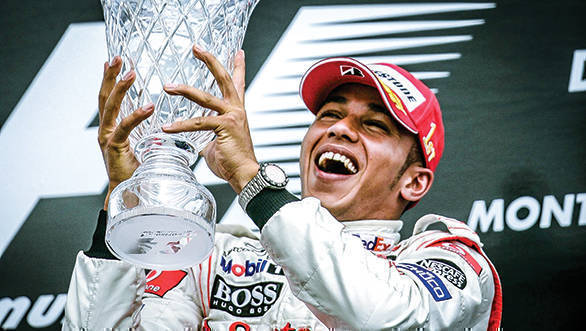 Hamilton's win at the 2007 Canadian Grand Prix made him, at that point, the youngest ever grand prix winner
Hamilton's win at the 2007 Canadian Grand Prix made him, at that point, the youngest ever grand prix winner
Things progressed very quickly from there, with a second place at the Malaysian Grand Prix, and another second place at the third race of the season at Sakhir, Bahrain. After the Bahrain Grand Prix, Hamilton was tied at the head of the championship standings with Fernando Alonso. After the fourth race of the season at Spain, he led the world championship. At the fifth race in Canada, Hamilton won his first Grand Prix, taking the title of the youngest F1 race winner away from the late Bruce McLaren, the founder of the F1 team that he drove for. In his sixth race, the United States Grand Prix, he was a double winner. Through the rest of the year, he remained in contention of winning the championship title in his rookie Formula 1 season. However, at the Brazilian Grand Prix, the last race of the season, Hamilton finished seventh, ultimately losing the title to Ferrari's Kimi Raikkonen by a single point. The following year, he would make up for it, winning the 2008 championship title by a single point from Raikkonen's Ferrari team-mate Felipe Massa. At 23 years and 300 days, Lewis Hamilton would become the youngest F1 world champion in the history of the sport. Sebastian Vettel would only break his record two years later.
***
The 2018 Brazilian Grand Prix proved to be a rather exciting race, with some fans declaring it to be the best race all season, a matter that is arguable. At any rate, Hamilton, who had won his fifth championship title the previous race weekend, was a somewhat unlikely winner of the race. However, the points earned from that particular win ensured that Mercedes took home the 2018 Constructor's title. It was to be the team's fifth consecutive title. And it was something that, quite naturally, made Hamilton very happy.
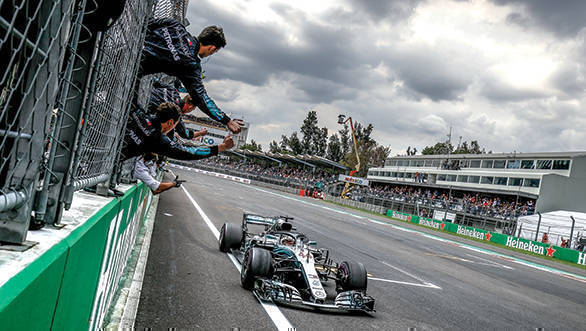 Crossing the chequered flag in fourth place at Mexico, Hamilton's Mercedes team celebrates, knowing that he's claimed the 2018 championship title
Crossing the chequered flag in fourth place at Mexico, Hamilton's Mercedes team celebrates, knowing that he's claimed the 2018 championship title
In the video footage of the three podium finishers in the cool down room at the Autodromo Jose Carlos Pace, Hamilton appeared calm. The other podium finishers were "Iceman" Raikkonen who had taken third, and Red Bull's Verstappen. At one point in the race, it seemed certain that Verstappen was the one who would take victory at Interlagos, and, had it not been for an incident between him and the Racing Point Force India's Esteban Ocon, that might have been the case. In the room, with just Hamilton and Raikkonen, Verstappen was visibly agitated. But Hamilton had a word of advice for the younger driver. "He had nothing to lose - and you had it all," he said to Verstappen, communicating to the Dutchman that he himself would have done things differently; perhaps leaving Ocon a little more room, thereby minimising the risk of losing the race.
But this is the Lewis Hamilton of 2018, who very rarely puts a foot wrong. A five-time Formula 1 world champion, whose years of experience are now very telling in the way he drives, and the way he reacts to situations. This is not the Hamilton of 2010, who might be tempted to overtake the Safety Car, as he did at Valencia. And Hamilton's days of clashes (most notably in the 2011 season, where repeated altercations with Felipe Massa often resulted in visits to the stewards' room) seem to be behind him. In fact, the general consensus seems to be that Lewis Hamilton is the best that he has ever been. In 2018, he's been unstoppable. Where others have crumbled under pressure (his rival Vettel in particular made more than one mistake, like at the German Grand Prix), Hamilton has remained unflappable.
***
Fernando Alonso isn't the only driver to have a hard time dealing with Lewis Hamilton as a team-mate. Hamilton's most fierce rivalry, perhaps, has been with his Mercedes team-mate Nico Rosberg. While Rosberg had been part of the Mercedes team since 2010, having had the measure of the returning Michael Schumacher, Hamilton's arrival at the team in 2013, proved to be challenging for the German driver. The two had been old friends and foes all at once, with a fierce rivalry on track, and off it too. There's a story that Hamilton told the press at Melbourne in 2013, of how when he realised his karting rival Rosberg was able to ride a unicycle, he was determined to learn to ride one as well. And so he did. According to Rosberg, Hamilton had mastered riding a unicycle in two hours. People who have worked closely with both drivers say that while Hamilton was naturally more talented than Rosberg, it was Rosberg who was more analytical, thus beginning to draw comparisons with that other famous F1 rivalry. That of the naturally faster Ayrton Senna, and the professorial Alain Prost.
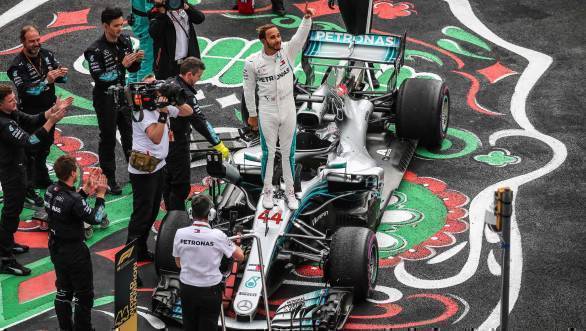 Waving to the fans after the 2019 Mexican Grand Prix
Waving to the fans after the 2019 Mexican Grand Prix
In 2013, Rosberg won two races to Hamilton's one, but it was Hamilton who would prove to be more consistent, ending the season with more points in fourth. Rosberg would have to settle for sixth. But trouble had been brewing between the two drivers as early as the 2013 Malaysian Grand Prix. The "rivalry" was soon to lose the prefix "friendly". In 2014, the year Mercedes would get absolutely everything right, this same rivalry would become more and more fierce. Team orders would be issued, banned engine modes utilised, and on-track clashes and contact (like at the 2014 Belgian Grand Prix) would become more regular. Slowly the atmosphere within the Silver Arrows camp began to get very tense indeed. But, at the season finale in Abu Dhabi, where Hamilton won the race and the championship, Rosberg entered the cool-down room to congratulate his team-mate on the win. One year later, the atmosphere in the cool-down room was very different. Hamilton won the championship title at the United States Grand Prix, with three races to spare. But his first corner move on Rosberg, where he forced his team-mate wide, was not well-received. Things were decidedly awkward ahead of the podium ceremony. When Hamilton tossed Rosberg the cap he was meant to wear on the podium, a visibly annoyed Rosberg flung the cap right back at Hamilton. It was another one of those moments that brought to light just how fierce the rivalry was within the Mercedes garage. The following year, Rosberg won the 2016 championship at the season finale in Abu Dhabi, taking his only F1 title by five points. He then announced his retirement, with Finnish driver Valtteri Bottas taking over as Hamilton's team-mate starting in 2017.
***
In the 2018 season that's just gone by, Vettel has crumbled under pressure. Hamilton, it seems, hasn't broken a sweat. So what makes Hamilton as special and as invincible as he is today? It goes far beyond just the car, the resources at Mercedes, and the innate talent he boasts. To an extent, it seems like the freedom that Mercedes allows Hamilton, suits him, as opposed to the somewhat stifling environment at McLaren. Then, there's the fact that he works very, very hard at absolutely everything. Will Buxton, journalist and presenter, and former GP2 Series press officer, once wrote on his blog of how Hamilton wondered about Buxton's fluency in the French language. Buxton writes, "I told him it was a combination of living in Switzerland and watching Cartoon Network in French, and listening to the Michel Thomas educational CDs. He asked for a favour, and so I packed them up and sent them to him. Why? Because he felt it was important to learn the language in which his team and engineers spoke." It might seem like something insignificant, given that it was a measure that wouldn't directly benefit his racecraft. But it proved Hamilton's commitment to his sport as a whole. His commitment to wanting to get better at it in any way possible.
More recently, his team-mate Valtteri Bottas has been vocal in telling the world just how hard it is that Hamilton works at his racing, saying that he is constantly training, or analysing his data, or spending time with the engineers at the factory. In fact, it seems as though the entire Mercedes team has been galvanised into performing exceedingly well. But Hamilton's approach has gone beyond just that. It extends to a lifestyle change. There was a period of time, soon after he fired his father, Anthony, from the role of his manager, when he admitted to being affected by the fact that he didn't have the people he needed around him in a racing situation. While their professional relationship no longer continues, the filial respect has returned. Hamilton also credits being fitter than ever before to a vegan diet. He works closely with physio Angela Cullen to make sure that he has no distractions during a race weekend, and is able to focus solely on the racing itself. It is reminiscent of the relationship Schumacher shared with his long-time physio Balbir Singh.
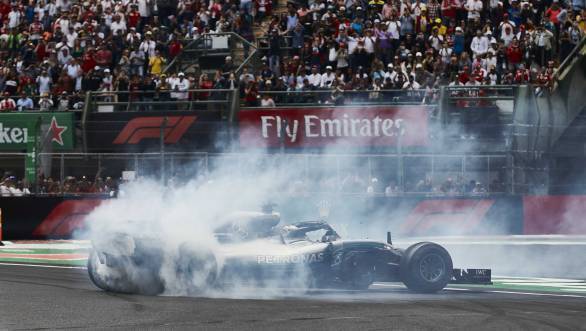 Hamilton's vegan diet doesn't prevent him from indulging in this sort of donut. Here he is treating fans at Mexico to some, after title No.5
Hamilton's vegan diet doesn't prevent him from indulging in this sort of donut. Here he is treating fans at Mexico to some, after title No.5
But what is it that sets Hamilton apart from the rest of the racers once he is inside the car? In an interview in the July 2018 issue of F1 Racing magazine, Rosberg said to journalist Andrew Benson, "Lewis is extremely good at braking." He clarified what he meant by speaking of how when braking, and being on the limit, Hamilton had the ability to control the front locking. That he had the sort of reaction speed that allowed his brain to adapt to the situation, giving him a huge advantage over rivals, going on to say that Hamilton's instinct was "amazing." Where other drivers might react to a situation that's already happened, Hamilton isn't reacting, so much as he is adapting to the situation, making it suit his needs and purposes. Once again, reminiscent of what rivals said of Michael Schumacher.
With 82 poles, as of the 2018 Brazilian GP, Hamilton is now 14 clear of Schumacher's record. He now has a total of 72 F1 victories, just 19 short of Michael's all-time record of 91. And, he is two championships short of equalling Schumacher's record of seven F1 world championship titles. Many believe Hamilton will break both those records. Many also believe that he already is F1's G.O.A.T, without controversy marring any of his title wins.
***
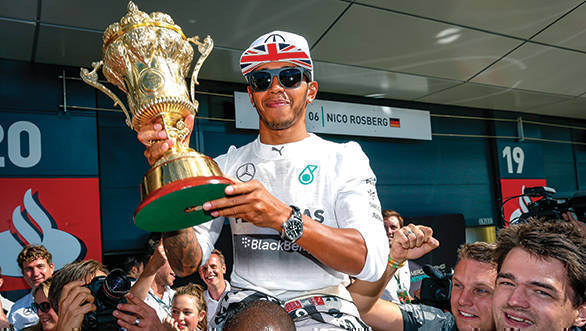 With the victor's trophy at the 2015 British Grand Prix where he took a masterful win in the wet
With the victor's trophy at the 2015 British Grand Prix where he took a masterful win in the wet
As a youngster in karting, Lewis Hamilton dreamt of racing for McLaren, someday winning the championship title with them. He accomplished that very early on in his career. And then he went on to win four more titles. And he did it while pursuing a rather eclectic bunch of interests that include music, fashion, and a fair amount of jet-setting, much to the annoyance of a press that believed he didn't fit the image of an ideal clean-cut racing driver. Well, Hamilton certainly is a departure from the usual F1 world champion. He's broken the mould. Or rather, he never fit the mould to begin with. In fact, if he'd fit the mould, he might never have gone up to McLaren boss Ron Dennis as a 10-year old, and declared that he wanted to race for his team someday. If he hadn't done that, he might never have landed a contract with the team just three years later. And if that hadn't happened, the chain of events that led to his current dominance in Formula 1, would never have been set off. And we wouldn't be living through this particular epoch of Formula 1. An era of the sport that one might term "Hammer time".
